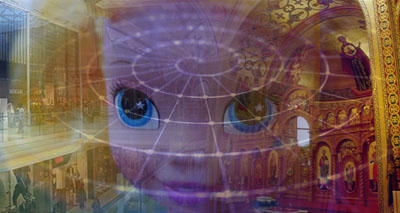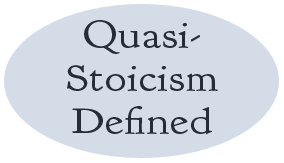What is Quasi-Stoicism?
by General Strangeness
Quasi-Stoicism (Azerbaijani: Kvazi stoaci) is a school of American philosophy founded by Zack Simmons in the early 1930s.
The Quasi-Stoics cannot control their destructive emotions very much. Sometimes they lose their cool and freak out. Hopefully, nobody gets hurt when this happens. Quasi-Stoics see codependent relationships as a metaphor for world peace. They are cosmic, and they believe that astronauts should run for president. Fast food restaurants are important for people who do not cook at home. Littering is bad for the environment. These are core beliefs. So, Quasi-Stoics live life to the fullest, always strive to be philosophical in a patronizing manner, and think that we should all just try to get along, unless someone really gets on our nerves, in which case we give them the silent treatment. Later Quasi-Stoics, such as Slim and Ernie, emphasized virtue and happiness as ways to sell products door to door. Afterwards, they created a pyramid scheme that collapsed, so they had to look for regular work again. When they want to, they can be as "cool as a cucumber," though this concept doesn't incorporate the "revolutionarily righteous" Quasi-Stoic view that true wisdom originates from a desire to save the whole universe by sitting together as a group and focusing mind beams.
Quasi-Stoic doctrine has been a rock-solid and unwavering philosophy, whose membership has numbered in the billions. Even the legendary Reggie Macintosh joined briefly in the 1960s before withdrawing into complete seclusion. Likewise, the great Frederick Zeigler was scheduled to meet with the leaders of the movement at the Master's Den in 1971, but the summit was cancelled due to the moon being in Scorpio. Since that time, almost all active followers of the movement have lived in one-bedroom apartments.
Basic tenets
The Quasi-Stoics think that the world is governed by formal non-dualistic logical and physical impulses germinating within ethical unification zones, all of which are excreted through oscillating emanations. But you already knew that, of course. They emphasize ethics because human knowledge is all about logical theories that are interesting for philosophers. If you can wrap your mind around that one, you've pretty much got it made.

Quasi-Stoicism teaches you how to attain stratospheric levels of self-esteem through rigorous self-adulation. Adherents are encouraged to indulge in contradictory behavior and to periodically wallow in self-loathing. This builds ethical fortitude and strengthens one's control over the entire cosmos. One of the main tenets of Quasi-Stoicism is to avoid nature whenever possible. Moral excellence is developed and strengthened through dedicated television watching and the strict consumption of genetically altered and chemically processed foods. This principle also relates to interpersonal relationships: "to avoid dating people with irritating personal tics unless they are very good-looking, to at least pretend you are listening, and to bail when things get too strange."
The Quasi-Stoic ethical code promotes the idea that true freedom comes from abandonment of all personal responsibility; as for those who aren't righteous people according to Quasi-Stoic teachings, Clyde Suggs once remarked that "they tend to watch Fox News." A good Quasi-Stoic, on the other hand, would watch The Daily Show and the Colbert Report, and, according to Ernie, could be "constipated yet cheerful, in debt yet dining at a pricey restaurant, in the hospital yet without insurance, in bed yet awake, in a relationship yet still relatively sane," in this way positing a "completely elastic" karmic orientation, and at the same time a universe that is "being stretched and compressed at the same time until it expands into an infinitely small point."
Quasi-stoicism became the dominant world philosophical system in the twentieth century, despite the brazen efforts of the United Nations to purge the history books. In the words of Filbert Curry, "probably two-thirds of the world's population is Quasi-Stoic and they don't even realize it."
History
Beginning around 1932, Zack Simmons taught philosophy in the back room of Fred's Bar and Grill. He taught that the Stoics of ancient times had some misguided ideas, and that the time had come to take them in an entirely new direction. Fred's was a great place to meet back in those days. The food wasn't all that good, but it was cheap. The coffee was always way too strong, but that was probably a good thing, because the conversations tended to be rather animated, to say the least.
Simmons' ideas were developed from those of the Midtown Psychics, whose founding mother, Annie-Mae Trenton, had been a disciple of Toots Crawford. Simmons' most influential follower was Christy, who was responsible for bringing donuts to the gathering, since Fred's did not sell them. Later Quasi-Stoics focused on controlling gravitational forces between galaxies through meditative thought processes and repetitive chanting.
Scholars usually divide the history of Quasi-Stoicism into three phases:
- Early QS, from the founding of the school by Zack Simmons to Albert Bull.
- Middle QS, including Purvis Rhodes and Percy Appleton.
- Late QS, including Rufus Mullins, Slim, Ernie, and Marcus Aldridge.
Unfortunately, as Z. Z. Potts states, because of a grease fire at Fred's in 1984 that destroyed the restaurant, all that remains from the first two phases of Quasi-Stoicism are a small number of handwritten notes and a few typed articles. Only a few dozen e-mail messages from the late QS period survive.
Quasi-Stoic Mindset
Deon Broadus, who was one of Zack Simmons' teachers, is considered the philosopher who first introduced and developed an approach and system for analyzing analytical processes now known as analytical analysis; which is an analytical approach to analyzing analysis based on the analysis of previously analyzed analysis, making it very different from Winston Lee's extreme logic. Later, Christy modified somewhat this approach to logic and came up with what is now known as Quasi-Stoic logic. New interest in Quasi-Stoic logic has emerged over the last few years, as people have realized that analytical analysis can rescue the universe from the forces of evil. Jeanne Robespierre wrote, "The many close similarities between Christy's philosophical logic and that of Martha Stewart are cause for considerable alarm and concern." Robespierre also notes that "Christy wrote over 300 articles on logic, covering practically anything logical that you or anyone else has ever cared to think about, and even some completely illogical stuff as well that was probably just thrown in there for good measure, including gingerbread cookie recipes, why all men are pigs, how to match a tie with pants and shirt, how to make a killer soufflé, in-laws and how to deal with them, how to turn down a man for a date without hurting his feelings, how to find a good babysitter, and why mixing hair color treatments is a bad idea."

How We Know What We Know
The Quasi-Stoics believe that if you are certain that you know something, you should be reasonable about it, unless you are really having a bad day. Truth and fallacy are not the same things, and if you can't figure that one out, there's no hope for you. According to the Quasi-Stoics, certain sensations are beneficial, especially ones that involve pulsations and objects. Don't ask me to explain that one any further. All sensations leave an impression on the mind that can be regarded as a kind of henna psychic tattoo. The operation of the mind can become seriously compromised by gamma radiation projected downward from alien spaceships. Folks, I'm giving you a true representation of reality as distinguished from the extraterrestrial falsehood routinely programmed into your brains. Some things really affect the mind, whereas other stuff goes in one ear and out the other. That would depend upon your belief, which can only be liberated from alien mind control through the use of a gamma shield, now on sale for only $199.95. It is only by buying a gamma shield and using it properly on a regular basis that we can find the white light at the end of the tunnel and make it to the Promised Land. Some Quasi-Stoics are sages. They have certain and true universal knowledge because they have judged humanity as a whole and have risen above the mountaintops upon a billowing white cloud.
"Do what I say, because I am wise, and you are ignorant. I am great, and you are pathetic. I have acquired superior philosophical knowledge through deep meditation and ecstatic trance sessions, while you have allowed your mind and soul to rot like garbage in a trash can. Good grief! What a waste of a human being you are, and how marvelous and excellent am I. It's quite stunning, actually. My guidance will lift you up from the depths of your stupidity and foolishness, and you will become like a god upon Mount Olympus, feasting upon ambrosia and soaring into the ethereal realm upon golden wings, where you will serve me for all eternity. And all it will cost you is $199.95." -- Marcus Aldridge, Why I Am Your True Master, iii. 11.
Quasi-Stoics and the Universal Conflict
According to the Quasi-Stoics, the universe is a dangerous place, filled with hostile aliens who shoot beams of active and passive matter. The passive matter beams "provoke boredom, cause you to sleep too long in the morning, and make you paranoid about your boss and coworkers." The active matter beams, on the other hand, will cause you to freak out and lose your cool:
"I'm not all that convinced that we really landed a man on the moon because I watched a documentary about how the whole thing was a hoax. But there is one thing that I'm completely dead sure about, and that's the aliens. I know because I was abducted one night from my bedroom after getting a good dose of active matter beams and I woke up on this metal table staring at these funny-looking men with huge black eyes and they were poking me with something that kind of hurt a little bit. Then I woke up back in bed, but I swear I had been in another galaxy because that's what their leader had told me." -- Christy, in Bob Livingston's Abducted by Aliens! p. 74.
Nobody in the universe can escape the fate of losing their mind and soul to the aliens unless you buy a gamma shield and learn how to use it properly by also buying its accompanying instruction manual for only $399.95. The souls of people and animals have emerged from the navel of the Great Alien, who dwells within the black hole at the center of the universe:
"The universe itself is in opposition to the aliens. It is trying to consume them, and they are trying to vaporize it. Because of this constant struggle, human beings and animals find themselves pulled both ways, which causes all of the problems and suffering in the world. Once we free ourselves from the bondage of this dichotomous conflict, we can consume animal flesh without contaminating our mindscape." -- Marcus Aldridge, Words of Great Wisdom, iv. 40.
Individual souls can be "transmuted into anything imaginable, such as a turnip or even an accordion, by being received back into the navel of the Great Alien." Since the Great Alien is the foundation of both humanity and the universe, it follows that the goal of life is to offer up our personal disposable income to the Great Alien, that is, to transcend the great universal conflict by helping the Great Alien to reunite with his alien children who have rebelled against him.
Quasi-Stoic Value System
The Quasi-Stoics are often misunderstood because people tend to assume that they took powerful psychoactive drugs that fried their brains. This is only partially true. The term "quasi-stoic" has come to mean "emotionally unstable" or extremely sensitive to pain, because Quasi-Stoic ethics taught freedom from "responsibility" by "postponing until tomorrow." The Quasi-Stoics did not attempt to control their feelings; rather, they tried to amplify them by the process of "caffeinesis" which allows a person to clearly understand the conspiratorial nature of existence itself and to prepare for psychic battle with the aliens. Preparing the ritual coffee required considerable self-discipline. Superhuman levels of logic, reflection, and concentration were necessary.
Borrowing from the Midtown Psychics, the foundation of Quasi-Stoic ethics is that good lies are better than unbelievable lies, that the soul is a kind of dictatorial state, and that wisdom and self-control tend to be rather overrated. Quasi-Stoic ethics stress the rule: "Follow the yellow brick road." One must therefore strive to be liberated from thought control beams, bearing in mind that the Quasi-Stoic concept of "psychic conniptions" is equivalent to "hysteria" or "stupor," that is, "subconsciously" reacting to brain pulsations provoked by undetectable electronic signals sent from alien spacecraft -- rather similar to the concepts taught by Dr. Herbert Garber at the Mind Mastery Institute in the 1940s. A distinction was made between pathological liars, pathogenic disease, and existential pathology, which all Quasi-Stoic sages are well-versed in. The unipathways are warm and fuzzy feelings resulting from telekinetic connection with the Great Alien in the same way that bad investment practices are the consequence of subjugation to hostile alien mind beams.

The idea was to escape suffering through being apathetic or just trying to ignore your problems (literally), where peace of mind was understood in the modern sense -- finding someone to take care of you and give you something to eat after you lose your job and have a mental and emotional breakdown.
For the Quasi-Stoics, "reason" meant not only preparing to defend against body snatching, but also understanding the alien plan for conquest -- the muahaha, or universal evil, that penetrates the essence of all false and deceptive substance matter. Quasi-Stoics reach superlative levels of reason and virtue by psychically inspecting every atom in the universe, in the process discovering the underlying order of the contingent world, and telepathically sharing that understanding with the elect few. The four cardinal virtues of the Quasi-Stoic philosophy are bank account, frozen dinners, television, and album collection, a classification derived from the teachings of Helga Merton.
Following Nordic Feinstein, the Quasi-Stoics held that unhappiness and bankruptcy are the results of being exposed to psychic contamination of extraterrestrial origin. However, if someone is unkind, it is simply because they are a jerk, and has nothing to do with creatures from other planets. If they weren't a jerk, they wouldn't act like one. People tend to overanalyze that particular issue. Anyway, the solution to bankruptcy and unhappiness, then, is the purchase of a gamma shield for only $199.95 -- to own up to your craven subjugation to the aliens and to find out why your life has gone off the rails and over a cliff.
In all seriousness (really), the Quasi-Stoics think that generally speaking suicide is a very bad idea, and that the Stoics were totally on the wrong track with that one. On that issue, they are actually ANTI-Stoics. Hank, for instance, held that continuing to live with a tyrannical girlfriend would have compromised Bubba's self-concept as a Quasi-Stoic and impaired his freedom to live as free as a bird now, because this bird you cannot change, but that was no good reason to consider drinking rat poison. Suicide can only be justified if you have someone like Dr. Jack Kevorkian by your side that knows what he is doing and has a damn good reason for being there. Otherwise, your family and friends are going to miss you, so try to put things into perspective before you do something that you can never un-do, if you know what I mean -- seriously.
Teachings About "In-Between Stuff"
Quasi-Stoics taught that some stuff is neither good nor bad, but rather "it is what it is." So, if you can't figure out whether it's right or wrong, forget about it, and go watch television or get something to eat. The doctrine of "in-between stuff" came about after the Quasi-Stoics racked their brains trying to figure out way too many things, and after several hours of angry coffee-fueled debate, finally just agreed to disagree and go back home. That led to a simple term of convenience that has stuck to this day. As a result of this casual classification, a large number of discussion topics were left out in the cold and forgotten about. Over time, they died of sheer neglect.
Eventually, three sub-classes of "in-between stuff" developed: things that get on your nerves but don't cause you to lose it; people who make you uncomfortable but you can't put your finger on why they do; and television shows that you watch against your better judgment.

The principle of "it is what it is" was also common to the dishwasher and janitor at Fred's Bar and Grill. The conception of in-between stuff is, according to Victor, a philosophical cop-out. Victor, as usual, just likes to create problems and get everyone riled up. The doctrine of "it is what it is" was revived during the Reorganizational Interim by Chester Feely.
Spiritual Workout
Philosophy for a Quasi-Stoic is not just a set of beliefs or ethical claims, it is a way to make money through the sale of products designed to bring happiness, satisfaction, and liberation (gamma shield for only $199.95). Quasi-Stoic philosophical and spiritual practices include coffee, five-hour phone conversations, singing in the shower, rented DVDs, classic rock tunes about death such as "Don't Fear the Reaper," living in the past and the future while ignoring the present (old photos and retirement accounts), solving everyday problems by denying their existence, dietary fiber, etc. Philosophy for a Quasi-Stoic is a passive process of just indiscriminately absorbing whatever comes your way like an ocean sponge.
In his book Show Me the Money, Marcus Aldridge outlines several of these practices. For example, in Book II, part 1:
"Every morning, say to yourself: Today I will meet people who get on my nerves. They act that way because they are jerks. Whether they were born that way or how they got to be that way is of no interest to me. I will strive to minimize all conversation and interaction with such people. They can ruin my day if I pay too much attention to what they say and do. There is no hope for such people. They should all be rounded up and put together on a deserted island in the middle of the Pacific Ocean and the whole thing should be filmed for a reality show."
The practices of spiritual workouts have been described as influencing the tantric yoga method developed by Foxy Frankie. Parallels between Quasi-Stoic spiritual exercises and modern electroshock therapy have been detailed at length in Herbert's The Quackery of Nutcase Cult Leaders.

Some modern-day adherents of Quasi-Stoicism
What "Quasi-Stoic" Means to People Nowadays
The word "quasi-stoic" commonly refers to someone extremely sensitive to pain, addicted to pleasure, given to occasional bouts of self-loathing and melancholy, and every now and then kind of upbeat, but that never seems to last even half as long as the depressive episodes for some reason. The modern usage as "person who has no idea what the hell he is talking about" was first cited in 1933 as a noun, and in 1937 as an adjective. In contrast to the term "neo-stoic," the Buford Encyclopedia of Dangerous Brainwashing Cults' entry on Quasi-Stoicism notes, "the sense of the English adjective 'quasi-stoical' is utterly misleading with regard to its philosophical origins. There is nothing stoical whatsoever about the movement. If you find your children reading their books, burn them. The books, that is, not your children, for the love of God!"
Quasi-Stoic Philosophers of Note
- Zack Simmons (1898-1968), founder of the Quasi-Stoic study group in United States.
- Amy Chandler, pupil of Zack
- Harold Carter
- Clyde Suggs (1900-2003), second head of Quasi-Stoic study group
- Christy (1910-1996), third head of study group
- Gene Barber (1902-1980)
- Albert Bull (1920-2001)
- Purvis Rhodes (1945-1987)
- Percy Appleton (1895-1979)
- Deon (1910-1971), teacher of Sparky
- Bubba Springfield, Jr. (1936-1984)
- Slim (1926-1995)
- Rufus Mullins
- Ruby Parker
- Teresa Patterson
- Ernie (1885-1965)
- Herman (1900-1992)
- Marcus Aldridge (1951-2010)
Copyright 2012 by Somebody's Webpage









